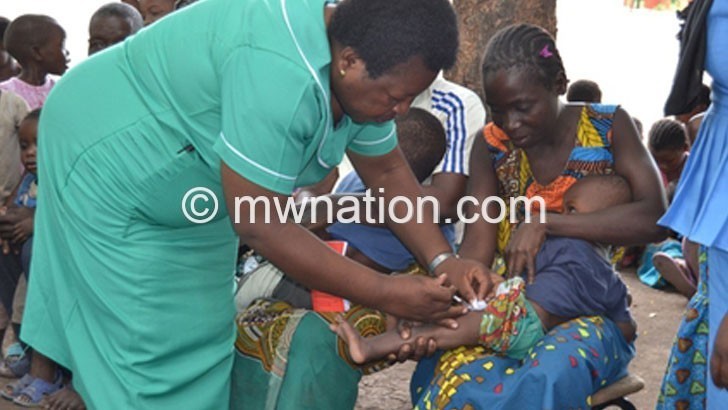2021: Scientists show new vaccine works against typhoid
Even as Covid-19 continues its rampage across the globe, an older health nemesis, typhoid, continued a more clandestine and increasingly deadly spread.
Typhoid infects an estimated 11 million people a year and kills more than 160 000, largely in Asian and African countries with poor water and sanitation systems.

Malawi has a high burden of typhoid due to the emergence and spread of multi-drug resistant strains, which are now common in the country.
An estimated 1.2 million typhoid cases and 19 000 deaths occur each year in sub-Saharan Africa, which includes Malawi. The vast majority of these infections occur in school-age and pre-school children.
Long treatable with antibiotics, the disease is growing resistant now, prompting health researchers to revive a vaccine developed to prevent it.
In a study published in the New England Journal of Medicine in September, the researchers at the University of Maryland School of Medicine shared their work which shows that a vaccine, Typhoid Conjugate Vaccine (TCV) can stop the infections.
They said a single dose of the vaccine was more than 80 percent effective in preventing the disease in thousands of children.
On September 16, principal investigator for the study at the Malawi Liverpool Wellcome (MLW) Trust Professor Melita Gordon pooled together journalists and researchers to share the study findings locally.
They had found that TCV was effective in protecting all the age groups under study from typhoid, kids were safe from serious adverse invents, and kept them protected for a long period of time.
Gordon said considering that typhoid is an increasing public health threat in Malawi and across sub-Saharan Africa with economic, social and health burdens, the findings signifies a relief from such burdens.
According to her, for every 100 typhoid cases, 44 families will receive a bad economic hit in terms of cost of treatment including medicines, transport, hospitalisation, 21 children will have serious complications such as jaundice, four children will have perforations and two children will die.
Their evidence, the scientists said, will provide heft to an effort already underway by an international group to distribute the vaccine in low and middle-income countries.
Because the vaccine works so well, the Malawi Government has plans to roll it out nationally next year. There will be a mass vaccination campaign for children between the ages of 9 months and 15 years.
Researchers hope that with a good logistic plan, a good community engagement through health surveillance assistants and people’s willingness to have their children get protected from the deadly disease, an estimated 6 to 7 million children will be vaccinated.
MLW acting director Professor Henry Mwandumba hailed the outcome of the typhoid vaccine trial, saying it bears testament to what can be achieved through global research collaboration.
Dr Kathleen Neuzil, chief investigator for the TyVAC consortium believes the TVCs have potential to protect millions of children and hopes other countries will introduce the vaccine in their immunisation programmes.
Typhoid is a bacterial infection caused by Salmonella enterica serovar Typhi and is a serious threat in many low and middle-income countries.
While typhoid is treatable, the effects can go beyond illness and death. Typhoid can impair physical and cognitive development in children, affect school attendance and performance, limit productivity, and reduce earning potential.
Neuzil says typhoid is one of those diseases that causes fever and systemic illness in children and was readily treated with antibiotics: “But the problem now is that it’s getting increasingly drug-resistant,” So it’s increasingly becoming severe and fatal again like before antibiotics were used.”
Unlike Covid-19, which is caused by a virus, typhoid is caused by a kind of bacteria, Salmonella Typhi, which is different from the salmonella that causes stomach distress in the United States.
Typhoid is spread through food and water contaminated with faecal matter. While the disease is far more prevalent in Asia and Africa, there are typically several hundred cases in the United States each year, mostly related to travel to developing countries.
For the study here in Malawi, where typhoid is common, more than 14 000 children were given the vaccine by Neuzil’s group, the Typhoid Vaccine Acceleration Consortium (TyVAC), which is based at the University of Maryland.
TyVAC is a partnership between the Neuzil’s centre, the Oxford Vaccine Group at the University of Oxford and the global nonprofit PATH, with the goal of accelerating use of so-called typhoid conjugate vaccines approved in 2017 that are designed to produce a stronger immune response.
The group compared results from another 14 000 children in Malawi who didn’t get the typhoid vaccine. They were given a vaccine for meningitis so they would still get an immediate benefit from participating in the trial.
The vaccine trial showed that protections from the typhoid vaccine may last for years, maybe five or more.
Work on the vaccine began in 2001 in India by Barat Biotech International, but the vaccine was not mass-produced before now for economic reasons, Neuzil said.
Basically, poor countries couldn’t afford it, while wealthier nations didn’t need it.





